Living at the Edge of Normal by Telamon Ardavanis
Reflecting on my Accelerating Life Amid the Pursuit of Accelerating Human Flourishing.
August 28, 2025
This is a guest post, first published on Telamon Ardavanis' Substack and shared here with permission. The views are Telamon's own and do not necessarily reflect the views of Edge City.
---
From Floods to Flourishing!
A couple of weeks ago, I finished my latest 2-month stint in Asia after co-hosting Edge City Lanna in Chiang Mai, Thailand, my third popup village. While I wish I could put that experience into words, I feel nothing does it justice, so here are some highlights that show the crazy day-to-day contrasts during this adventure:
From 500-year record floods to uncountable sauna & ice baths
From gene editing plants to building special economic zones
From Muay Thai training to the tallest peak in Thailand
From foot massages to d/acc days
From colour wars to cacao ceremonies
From playing with VR/AR art to urban planning
From hosting hackathons to co-producing a decentralised festival
From learning about stablecoins to ZK Proofs
From Devcon (the largest Ethereum conference) to the Great Wall of China
…
Yes, this is as crazy as it sounds!
If you know me, you know I live life fast. I overcommit. I am as restless as can be. Have always been nomadic to some extent. I aim higher than I could likely ever reach. Always down for a good story. I am delusionally optimistic. Diagnosed dyslexic and undiagnosed ADHD. Essentially, I want to do it all, at the same time, yesterday.
For better or for worse, my character, both from nature and nurture, undoubtedly allows me to achieve more and get more out of life than without. However, it also results in me being often late, procrastinating heavily, easily distracted, super slow at everything AND… really rarely reflecting on my adventures.
Eight months ago, I joined Edge City, and somehow, this has allowed me to turn the speed up a notch. Since then, life has been moving so incredibly fast that I am really struggling to take it all in. Hence, I am forcing myself to put aside my dyslexia excuse, take more time than it should logically need, and write a bit, actually reflecting on what seems to be a breakthrough period of my life.
What is that corny movie line? "Life moves pretty fast. If you don't stop and look around once in a while, you could miss it”? I don’t want to miss it.
What are you talking about!?
Who is Edge City? Wtf is a popup village? Why are you moving fast?
Edge City is dedicated to accelerating human flourishing by convening innovators, scientists, and technologists in immersive temporary villages.
We create scenes where ambitious builders co-live, co-work, and experiment across disciplines, driving transformative ideas and collaborations.
History shows breakthrough innovations and cultural shifts emerge from unique communities converging at the right place and time. Think Renaissance Florence, 1920s Paris, 1970s Silicon Valley…
Edge City accelerates this for the modern era by creating temporary villages that compress decades of community building into month-long experiments, uniting the world's most innovative minds across disciplines, borders, and generations.
Like Bell Labs' legendary innovation environment, we create spaces where identifying and pursuing truly transformative work becomes natural and inevitable.
Now, in my own words
At Edge City, we are striving to build the World's First Society Accelerator. How? With this surprisingly innovative, new format of human organisation called a popup village.
Since we currently lack the mental model for a popup village, let me give you some distant but helpful references:
- An extended tech conference
- Meets a world-class university summer school program
- Meets a cutting-edge moonshot startup accelerator
- Meets Burning Man’s decentralised experience design
The average Edge City is structured as a 1-2 month temporary community gathering, using permanent infrastructure to recreate a temporary campus experience. This includes all essential needs, such as lodging, co-working, meals, exercise, presentation and social spaces, and more, all located within a ~20-minute walking radius.
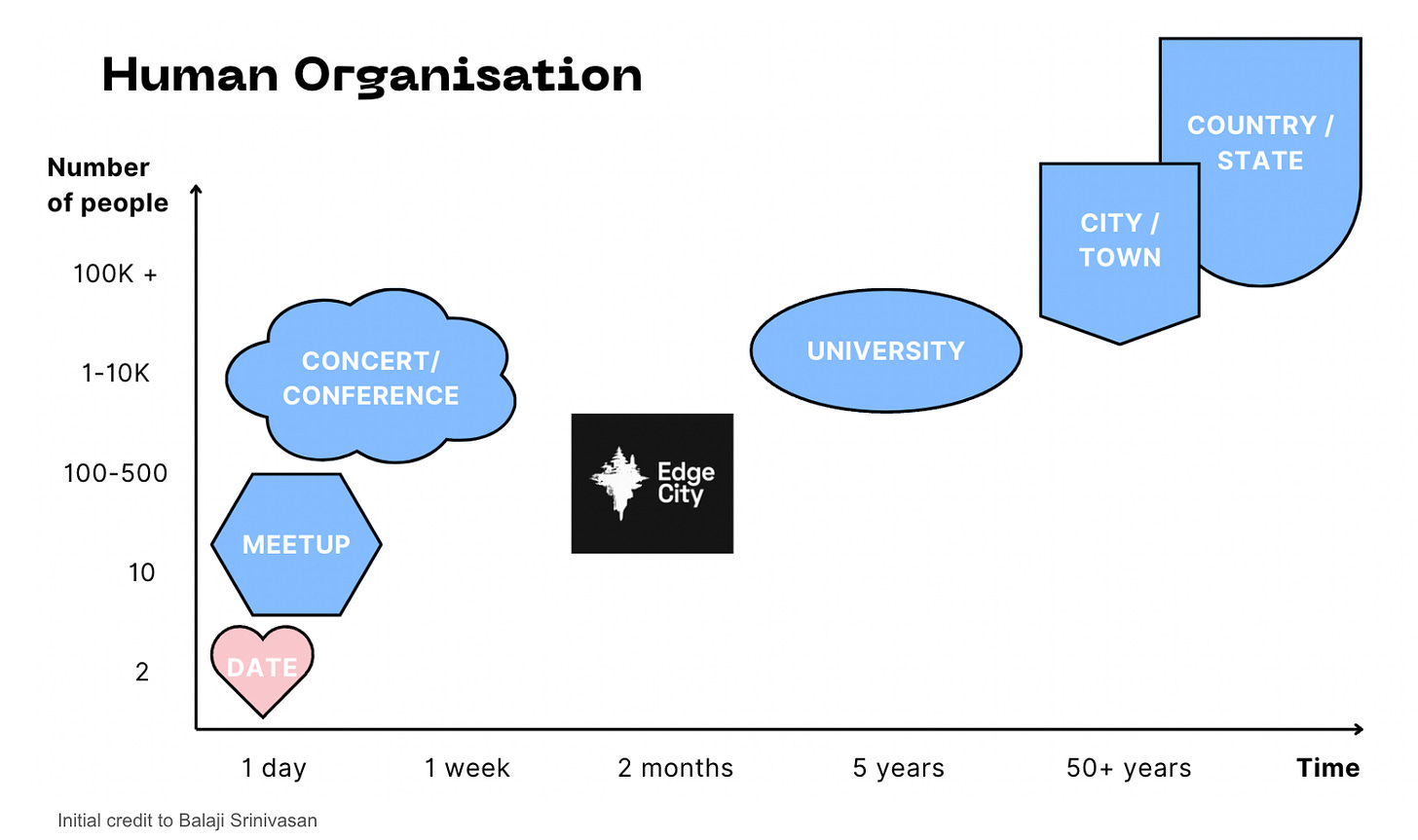
The community is curated via invitations and applications, and is selected loosely based on the criteria of being kind, curious, and working on something frontier or at the cutting edge of what is normal.
The entire experience is largely grassroots and community-driven, meaning over 95% of the programming, activities and events are driven by attendees and participants vs. it being a centralized, top-down agenda driven by us, the organizers (hence the Burning Man reference).
Four key principles shape the experience at our events:
- Build & Co-creation Focused When everyone participates in building our shared experience, magic happens. We create spaces where spontaneous collaboration becomes natural.
- Multidisciplinary Innovation thrives at intersections. We bring together diverse minds and disciplines, knowing breakthroughs often emerge from unexpected conversations and cross-pollination.
- Multigenerational: We make it easy for everyone to participate, from seasoned experts to families with children. Building the future works better when those who will inherit it are part of the conversation. (It takes a village to raise a child, and a child to raise a village!).
- Health & Wellbeing A better future requires healthy builders. We weave movement, nutrition, and recovery into daily life, making wellbeing effortless.
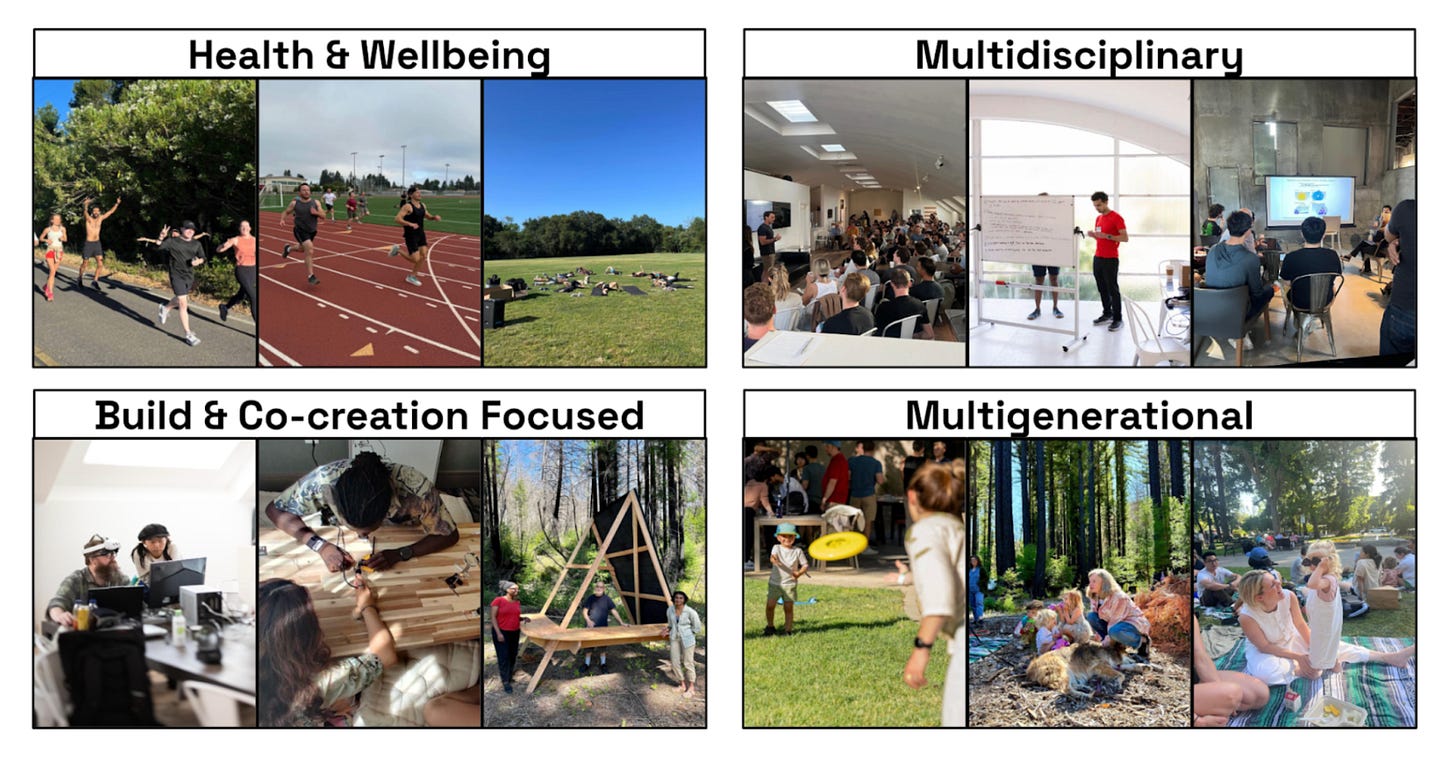
These pillars aren't just features - they're fundamental to experimenting with better ways of living and working together. When combined, they create a holistic environment where people can bring their full selves and truly thrive during their time at Edge City.
What is Edge City’s approach to “Accelerating Society’?
People, Projects, Places
People - Catalysing Culture
It all starts with the people. They are literally the bedrock of humanity. The world will be better if our people are better. If we want to continue improving the future, we need to continue improving and investing in our people. History shows us two fundamental approaches to advancing human potential:
- Incentives and Markets: As Charles Munger famously said, "Show me the incentives, and I'll show you the outcomes." Throughout history, we've experimented with various carrot-and-stick approaches to shape human behaviour. From oppressive dictatorships wielding the stick to capitalist systems dangling carrots of wealth and status, we've seen the full spectrum. While capitalism has arguably been the most successful at driving progress, these direct incentive models often fall short in some areas of society.
- Culture and Community: The more subtle yet profound lever is culture. When communities develop shared identities and values, they can achieve extraordinary things without explicit rewards or punishments. Look at Renaissance Florence's culture of artistic excellence, Ancient Athens' philosophical pursuits, or modern Silicon Valley's innovation ethos. This power of great culture shows up at every scale of human organization - from corporations to sports teams to ancient military forces like the Spartans, all defying the odds via a shared communal identity.
What's fascinating about culture is its ability to transcend traditional incentive structures. We've seen this in scientific communities racing to solve problems, in open-source software collaborating globally (i.e. Bitcoin and Ethereum), and in artistic movements pushing boundaries. Japan offers a striking example, where cultural values create extraordinary social trust - lost wallets are routinely returned intact, and violent crime is rare not from harsh penalties, but from deeply held cultural norms (see more here). This shows how shared values can shape behaviour more effectively than any system of rewards and punishments.
At Edge City, we're betting on culture as our primary catalyst while recognizing that the most powerful transformations happen when cultural and economic incentives work together. The extended format of our events creates the perfect container: when people spend weeks rather than days together, deeper connections form, real progress emerges, and new projects launch. This enables the emergence of new communal identities - something we believe popup villages are uniquely positioned to catalyze. These cultural patterns ripple outward as participants carry them into their networks, making "doing the right thing" not just an incentivized choice, but a natural expression of your community and culture.
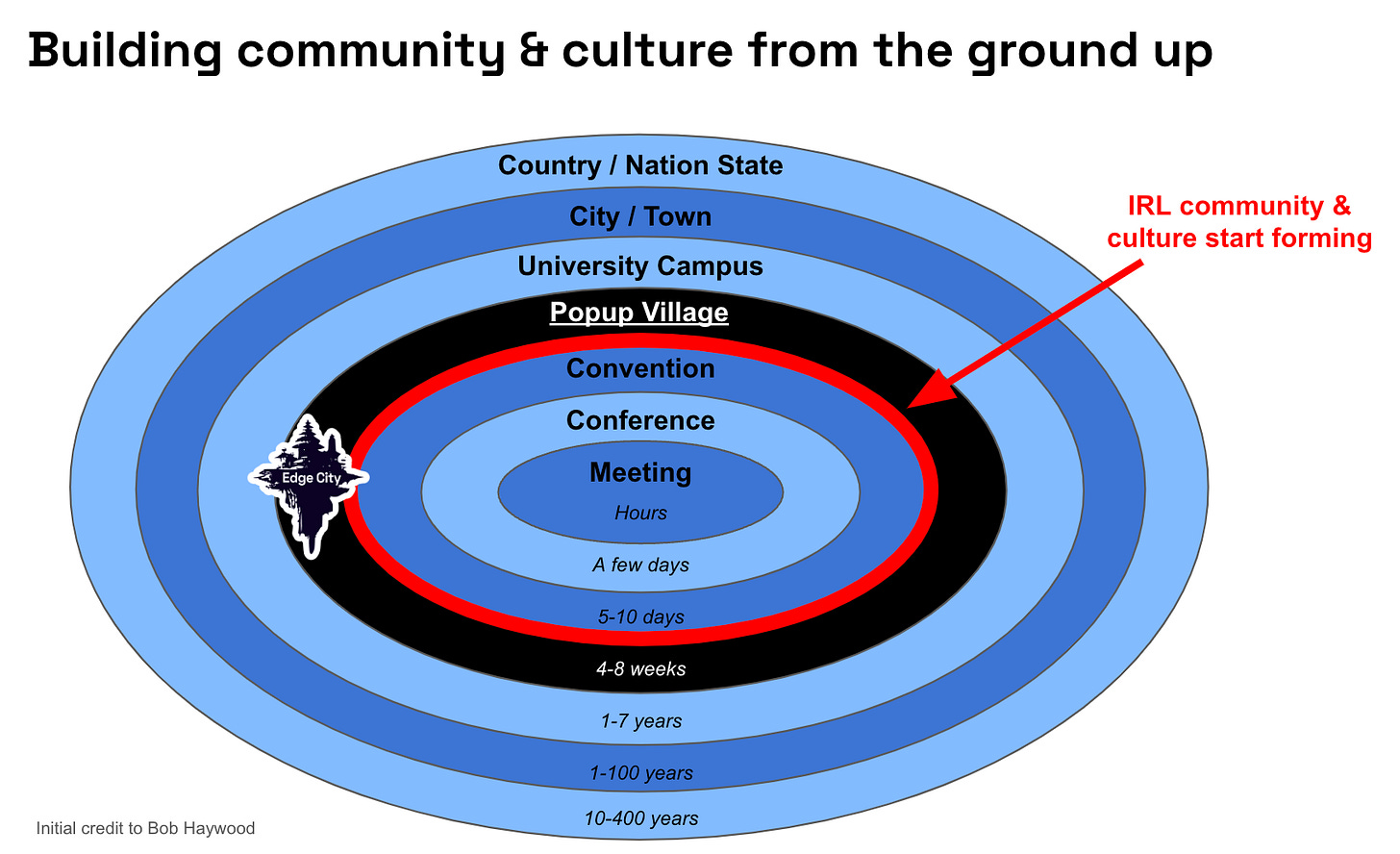
An example of how we have supported advancing culture is Crecimiento, a movement we helped incubate that is actively striving to revitalise Argentina’s economy, launched with the Aleph popup city in Buenos Aires in August 2024. See more on Crecimiento here.
While we've been fortunate to host pioneering figures like Vitalik Buterin, Grimes, Laura Deming, Justin Drake, Juan Benet, Emad Mostaque, and many other leaders across technology, science, and culture, we're equally committed to nurturing emerging talent. Through our fellowship, scholarship, and builder programs, we subsidize participation for promising innovators. This creates a unique environment where established experts and rising stars connect naturally, making Edge City both a gathering point for acknowledged leaders and a launching pad for the next generation of pioneers.
See more here on Zone of Scenius, - synergies of high-agency people collaborating.
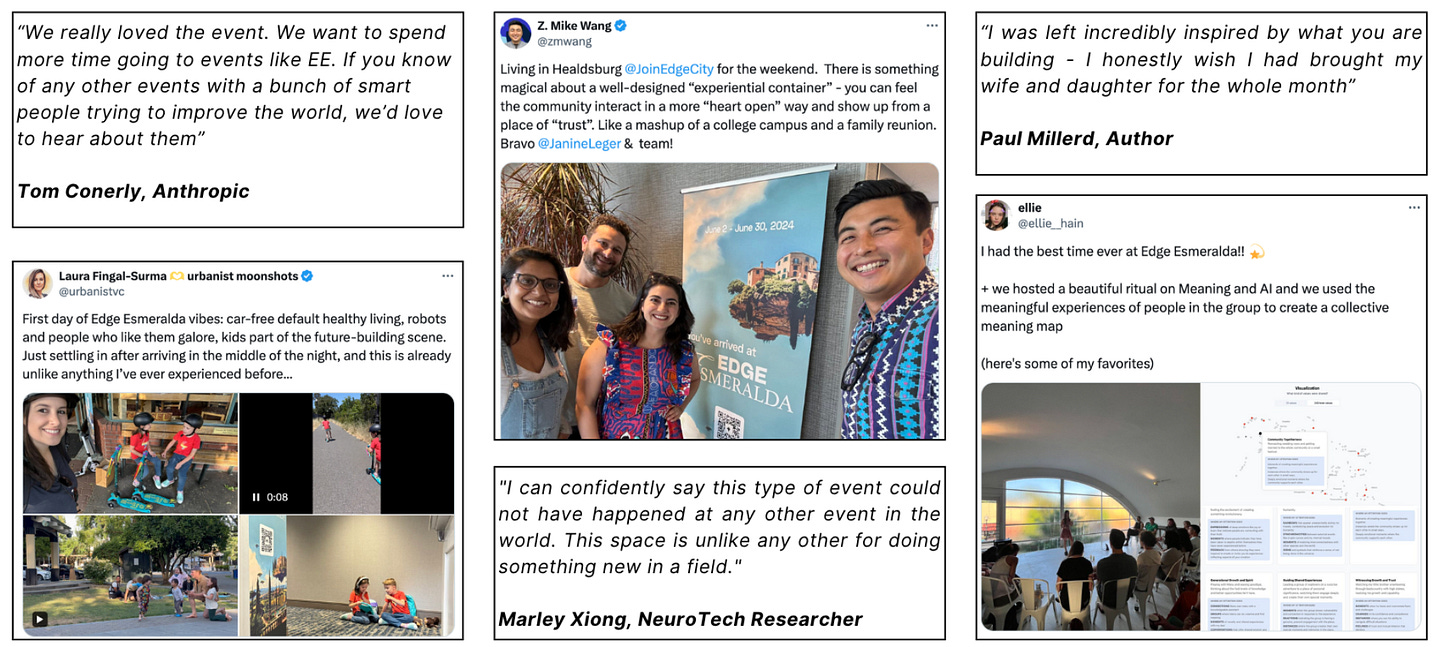
Some quotes from Edge Esmeralda 2024 attendees
Places - Physical Spaces
Physical spaces profoundly shape human connection, behaviour, and innovation. Throughout history, breakthrough moments have emerged from thoughtfully designed environments—from Building 20 at MIT's legendary "magical incubator" to Bell Labs' intentionally long corridors that forced researchers from different fields to collide.
We take this principle to heart in our popup villages. Keeping our events in semi-confined, concentrated, college-campus-like environments maximizes the surface of serendipity. This means you increase the odds of bumping into fellow residents, leading to the continued deepening of relationships, furthering ideas, iterating on conversations, and increasing the emergence of breakthrough moments.
But we're not just creating temporary spaces - we're actively exploring how these principles can reshape permanent communities. Our partnership with Esmeralda exemplifies this vision: a new town project in Northern California that's implementing these design patterns at scale. By helping seed these new communities, we're testing how thoughtful urban design can foster innovation and human flourishing beyond our popup timeframes. See more on Esmeralda's vision here.
Our popup village locations are chosen strategically, focusing on three key opportunities:
- Emerging macro trends - jumping into exciting moments like Argentina's evolving tech scene
- Local impact potential - finding places where our community can meaningfully engage with and catalyze local innovation ecosystems
- New city development partnerships - working with ambitious projects like Esmeralda where we can help lay the cultural foundations from day one
This approach lets us create vibrant temporary communities while actively shaping the future of physical spaces - whether we're energizing existing ecosystems or helping build entirely new ones.
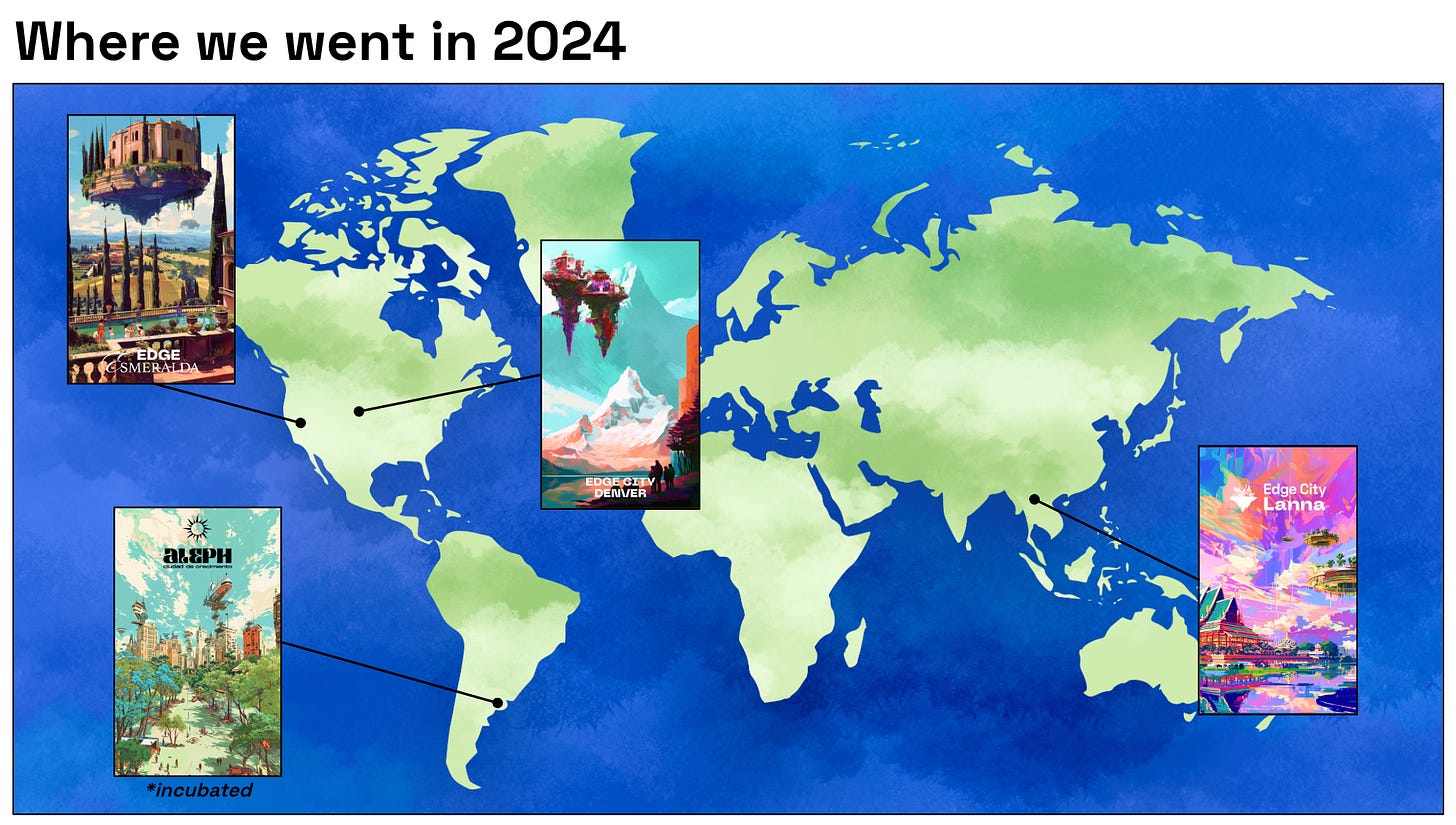
Projects - Technological Progress
While people and places form the foundation, innovation manifests through our supported projects and technological advances. We focus on areas we believe will reshape humanity's future, such as AI, biotech & longevity, governance, neurotech, hard tech, art, urban planning, new cities, web3 and cryptography.
We advance these fields through focused residencies, experimental initiatives, and structured hackathons. Our programming has supported numerous advancements:
In cryptography, collaborations with institutions like Uniswap Foundation and Ethereum Foundation have fostered academic progress, including Justin Drake's Sequencing Week launching the first based preconfs on the Ethereum mainnet. These partnerships have led to multiple published papers and established high-signal residencies (i.e. MEV Capture and Decentralization in Execution Tickets).
Lab Week with Protocol Labs, Foresight Institute, & Convergent Research has helped advance Neurotech, Human-AI Cooperation, Biotech & Longevity, and Extended Reality. These intensive collaborations explore frontiers from brain-computer interfaces to human-machine cooperation, while supporting emerging fields like DeSci and robotics.
In hard tech, we've supported ventures like Denizen's robotic 3D printing and Moonside Network's sustainable infrastructure. The Abundance Institute and Speculative Technologies have convened leaders across energy, transportation, and aerospace through our platform, fostering innovations in sustainable development and manufacturing.
Other notable initiatives include:
- Protocol Worlds - Exploring governance and protocols in digital-physical environments
- Cursive - Cryptography-powered social networking using ZKP and NFC technology
- ∈dges by RadicalxChange - Community currency experiment fostering local economies
- Network Nations - Examining multilayered governance and state structure evolution
- Interop Day - Advancing Ethereum interoperability by convening pioneers in the space
- Cities of Tomorrow - Exploring impact through popup cities and special economic zones
- ZuPass - Privacy-preserving identity systems powering community interactions
- Governance Games - advancing governance models and prediction markets
- Propel - An experiment with MetaMask’s Delegation Tool Kit to improve crowdsourcing events
Our hackathons have also engaged 500+ builders, resulting in over 200+ projects. Notable innovations include Zuvivor, using programmable cryptography to support sexual assault survivors, or Proof of Strategic Finance, a system preserving strategic advantages in M&A transactions through privacy-preserving mechanisms.
In addition, there have also been a handful of papers published, with numerous still in review resulting from our events and initiatives
By thoughtfully curating people and hosting extended-format popup villages, we create conditions for projects to thrive. We are confident this confluence of people, places, and projects will drive meaningful advances in human flourishing.
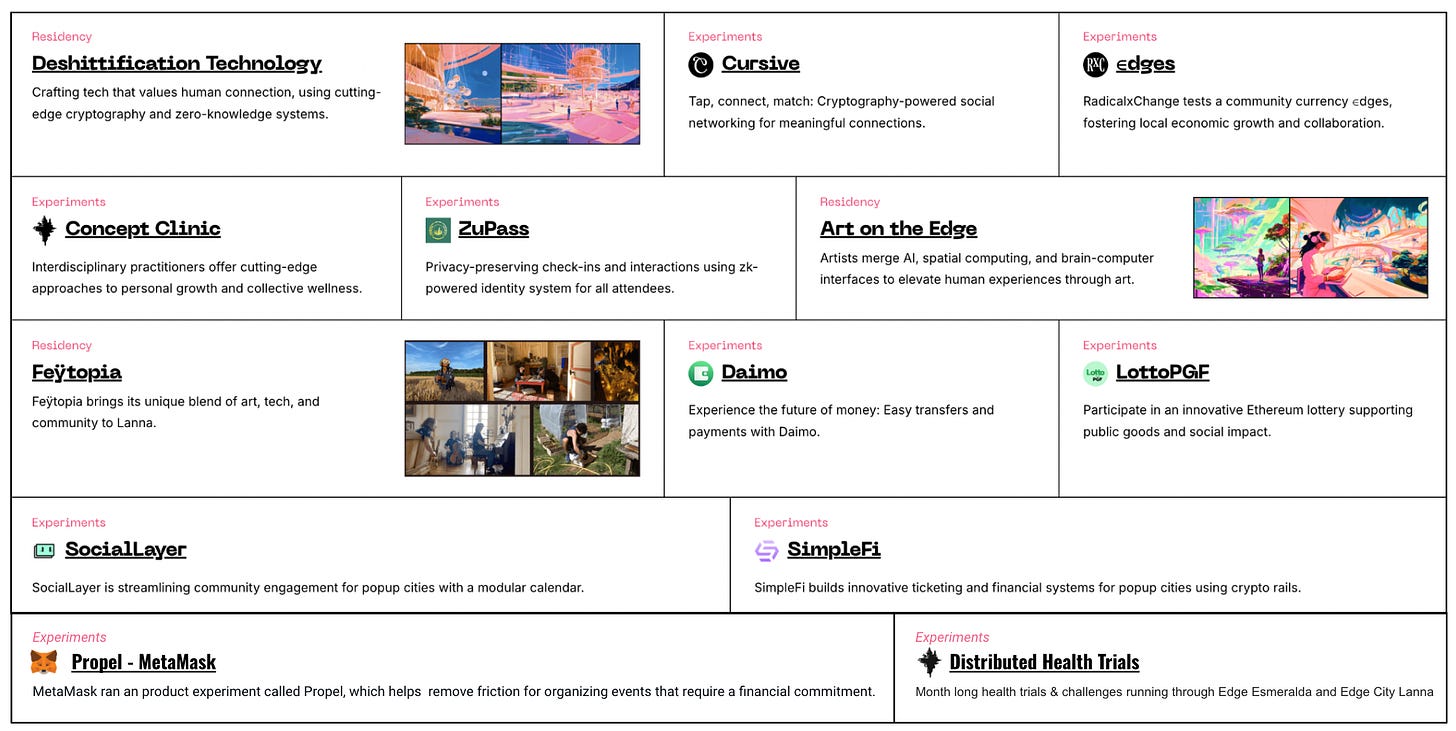
Notable residencies, projects & experiments at Edge City Lanna.
What personally excites me about Edge City?
Here are three additional points where I find Edge City's influence on social norms particularly fascinating. These are my personal early theories that I am excited to explore further in 2025.
1. Networking is not working - Debunking Dunbar’s Number
Dunbar's Number suggests humans can maintain roughly 150 stable social relationships - this is based on the correlation between primate brain size (particularly the neocortex) and social group size.
However, Edge City's popup village format might actually "hack" these limitations through several unique mechanisms:
- Compressed Time-Space: By creating an environment of intense, focused interaction over 1-2 months, popup villages accelerate relationship formation far beyond normal social contexts. When people live, work, and create together 24/7 in a confined area, they might form deeper bonds in weeks that would normally take years.
- Aligned Purpose + High Trust Environment: The careful curation and natural magnetism of kind, curious, frontier-focused individuals to our experiences create an unusually high baseline of trust and shared values. This "pre-alignment" could reduce the cognitive load typically required for relationship maintenance.
- Multi-Context Interaction: In normal life, we often know people in single contexts (work or social or hobby). In popup villages, you might do morning exercise, afternoon work sessions, and evening socializing with the same person - this multi-context exposure rapidly deepens relationships.
The key insight is that Dunbar's Number might primarily apply to the cognitive load of maintaining relationships across typical time and space constraints. By radically altering these constraints through intensive co-living and shared purpose, popup villages could enable deeper and more numerous meaningful connections than would be possible in traditional social structures.
As someone who moves a lot, I truly believe Edge City offers a unique solution to the so called "traveler's paradox" - the challenge of building deep connections while constantly on the move. These intense co-living experiences create what I think of as "time capsule connections," relationships that somehow remain fresh even after months apart and can not only instantly reignite at the next village, but you could see existing for a lifetime.
I'll be the first to admit I've used "networking" as an excuse to justify countless experiences, both fun and not-so-fun, that have rarely led to meaningful relationships or opportunities. Edge City's model creates something fundamentally different in my opinion - a new type of global community that doesn't just accommodate ambitious, nomadic, extroverted, fast-paced lifestyles but actually thrives on them, increasing your meaningful connections.
As Mike Johnson puts it: “A month gives people time to unfold themselves — the feeling of social abundance takes a while to grow.”
2. Global Prosperity - Decentralising Innovation Hubs
Throughout history, transformative innovation has been remarkably concentrated in specific geographic locations. From Ancient Greece's philosophical breakthroughs to the Islamic Golden Age's scientific advances, from Manchester's Industrial Revolution to Silicon Valley's technological explosion - groundbreaking progress has typically emerged from distinct innovation hubs bound by place and time.
This geographic concentration of innovation wasn't arbitrary. It arose from the convergence of key factors: access to resources, concentration of talent, supportive cultural environments, and often, proximity to centers of power and wealth. People seeking to participate in these innovation ecosystems had no choice but to physically relocate, often facing significant barriers - from complex visa regulations to language differences to cultural adjustments.
I've experienced these challenges firsthand, navigating life across five countries and four continents. Whether it was applying for visas to access the US innovation economy, relocating to the UAE for tax advantages, growing up in South Africa for quality of life, or seeking Germany's and Finland's educational opportunities - each move revealed how traditional systems of innovation and opportunity remain frustratingly geo-fenced.
However, we're witnessing the early stages of a profound shift. The combination of remote work, digital tools, and increasingly borderless technologies is beginning to break down these traditional geographic barriers. Popup villages represent a new model in this evolution - creating temporary but intense innovation hubs that can materialize anywhere in the world. Rather than requiring permanent relocation to access opportunities, this model allows communities to form and reform dynamically, bringing together diverse perspectives and talents that traditional innovation hubs might never have accessed, while also possibly inspiring new permanent hubs and connecting old ones.
I believe the implications for global prosperity are significant. By nurturing startup cultures and innovation mindsets in communities around the world, we can unlock new sources of opportunities, economic growth and shared development. Countries with higher startup densities per capita tend to enjoy higher GDP per capita as well, suggesting that democratizing entrepreneurial opportunities can be a powerful driver of global progress. Creating more "popup villages" that foster local innovation ecosystems has the potential to spur job creation, inject new ideas into the global innovation pipeline, and fundamentally reshape the geography of prosperity worldwide. Exporting the culture of entrepreneurship, founders, and innovation to accelerate startup ecosystems beyond traditional hubs represents an opportunity to unlock the full economic value of human creativity and problem-solving on a truly global scale.
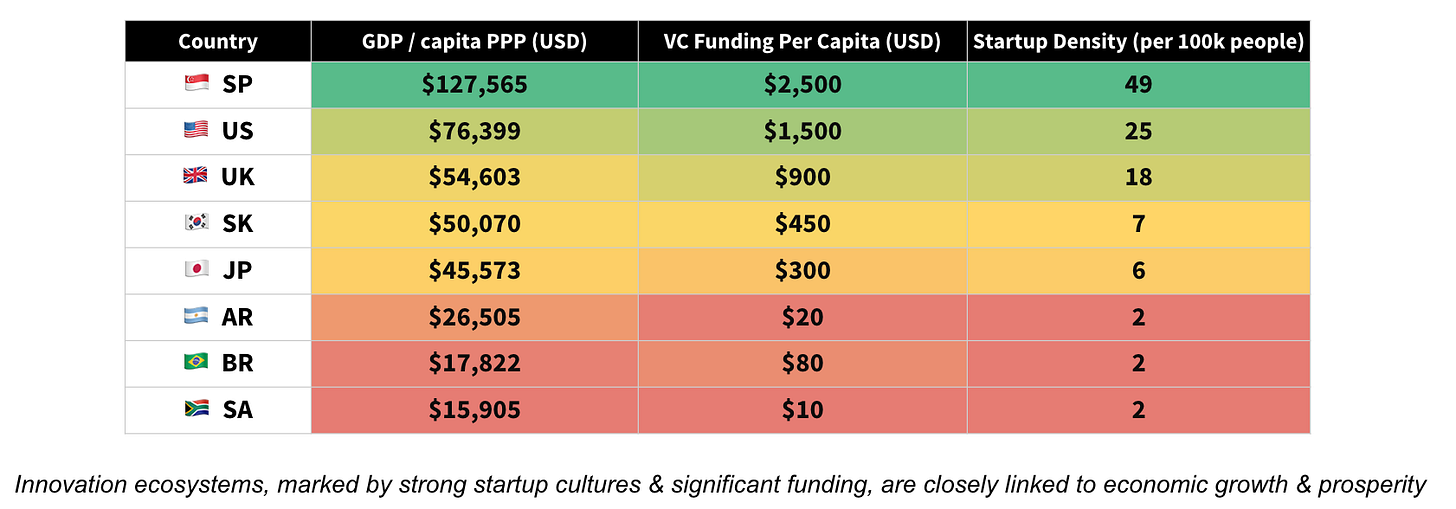
Initial credit to James Tunningley (worldometer 2022)
3. The evolution of Society and Human Organisation
Looking at the evolution of human organization - from nomadic bands to settled villages, from city-states to nation-states, and now to our increasingly digital society - I can't help but wonder if we're coming full circle. For 190,000 years, humans were predominantly nomadic. Only in the last 10,000 years did we settle into villages, pushed by agricultural innovations. Now, technology is enabling a new kind of nomadism - digital, connected, and purposeful.
Throughout history, major societal shifts have been catalyzed by key innovations working in concert: farming and the wheel enabled settled civilizations; money and paper transformed kingdoms; the printing press and gunpowder shaped nation-states; while engines, electricity, and telecommunications birthed our digital society. Today, we're witnessing a similar convergence: blockchain restructuring trust and coordination, AI reshaping human capabilities, and neurotech promising to revolutionize the human experience.
The momentum of innovation is accelerating on multiple fronts: advances in biotech and longevity science may significantly extend human lifespans, while transportation breakthroughs - from the democratization of travel through platforms like Airbnb and Uber to the rapid advancement of space technology - are making movement across Earth and potentially other planets more accessible than ever before. By the end of this century, we likely will not just be organizing global communities, but interplanetary ones.
Popup villages might just be the perfect bridge between our nomadic past and our networked future. At Edge City, we're seeing how these innovations complement each other: AI enhancing our collaboration, blockchain enabling novel governance models, all while our physical gathering patterns echo our species' ancient rhythms. As we move towards increasingly digital, decentralized and globalized worlds, popup villages could be more than just a temporary experiment - they might be a glimpse of humanity's next organizational form.
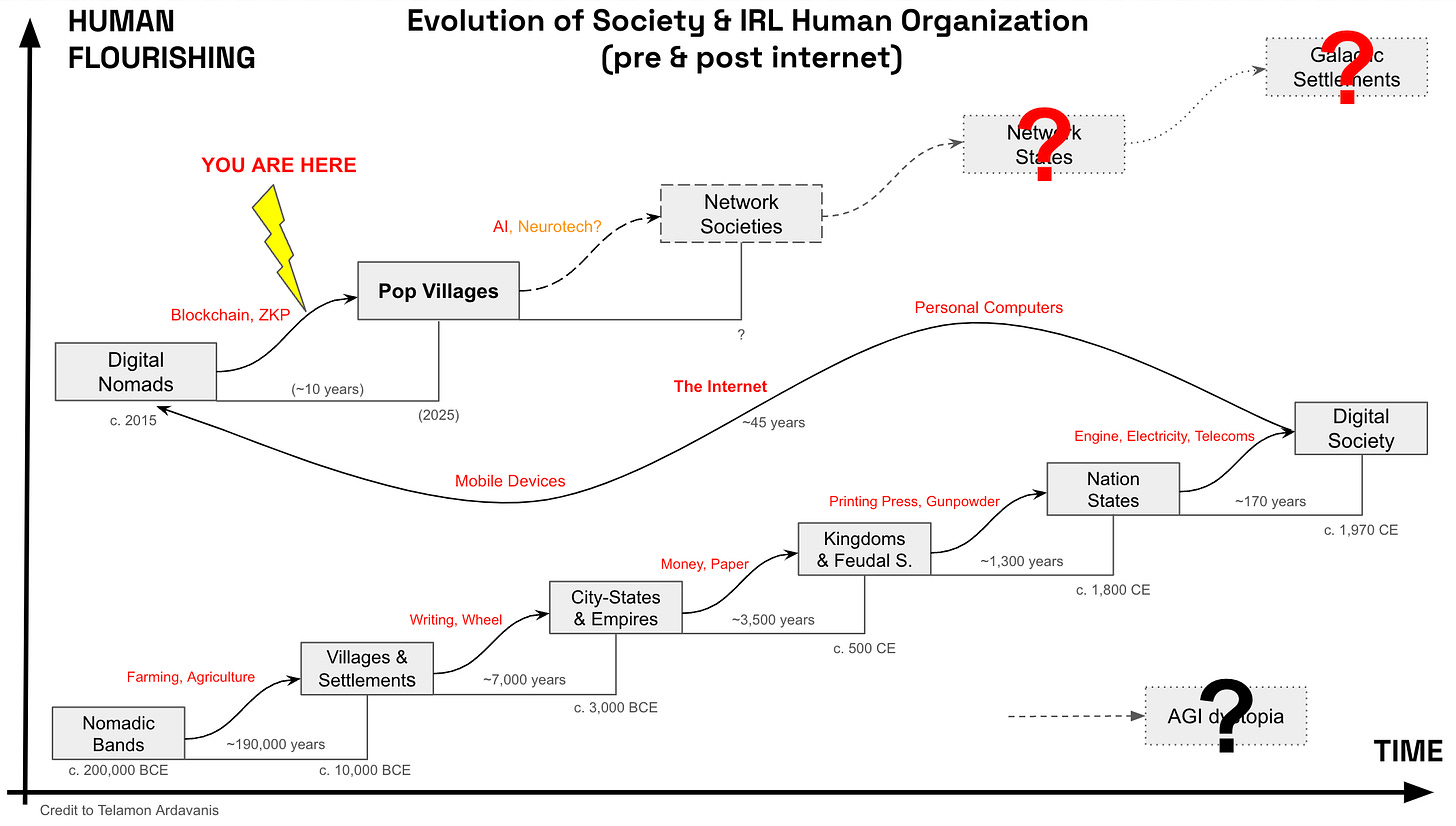
Looking at the timeline, we can see how technological and social change has been accelerating dramatically. While it took thousands of years to move from farming to writing, and hundreds of years from printing press to electricity, recent shifts are happening at a breathtaking pace. The Internet fundamentally reorganized society in just a few decades. Now, as we're still adapting to Web3's transformation of ownership and trust through blockchain, AI has emerged as an even more powerful accelerant of change.
However, this acceleration brings both opportunity and risk. While technologies like artificial general intelligence could dramatically enhance human potential, they could also lead to dystopian outcomes if not carefully managed. The d/acc (decentralized/defensive acceleration) model proposed by Vitalik Buterin offers an interesting approach for navigating this challenge - suggesting that rather than slowing down, we should thoughtfully accelerate the development of beneficial technologies while building in decentralized safeguards. This approach to technological advancement might help us better balance innovation with safety.
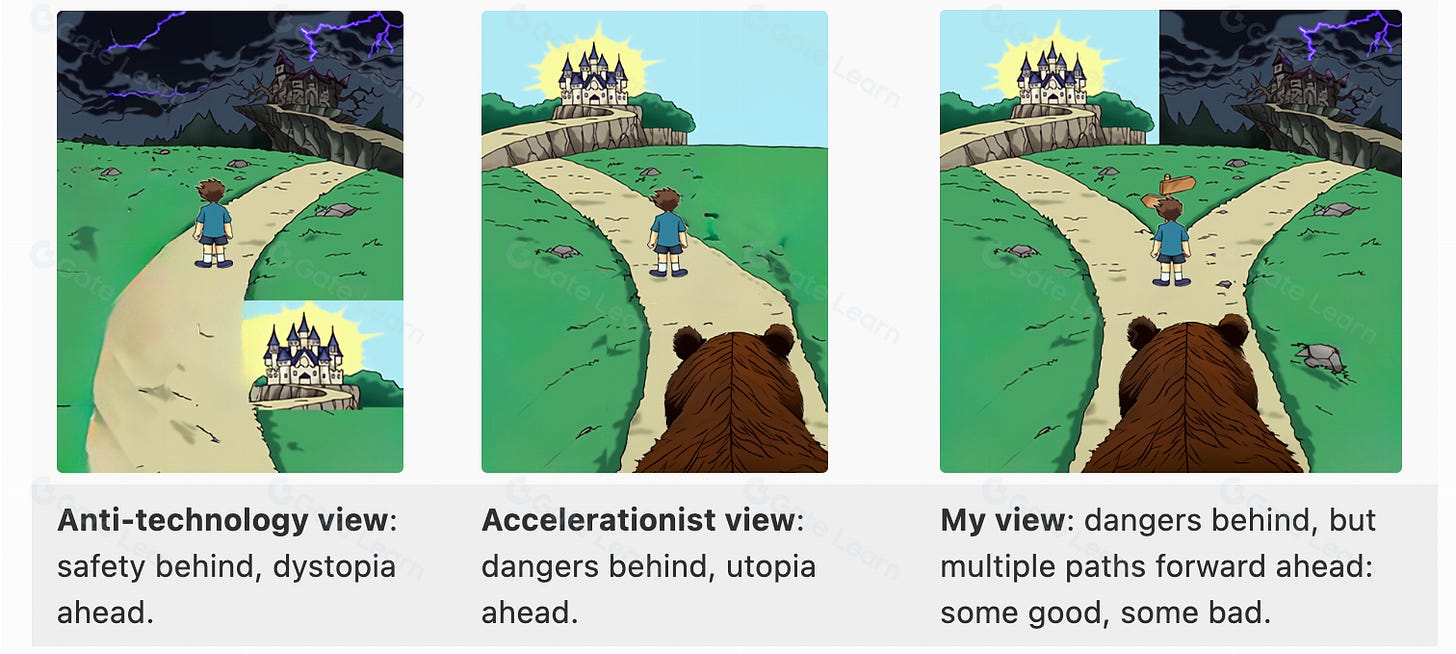
Credit to Vitalik Buterin
Balaji Srinivasan's concept of Network States offers an intriguing framework for this evolution, envisioning communities forming digital-first nations based on shared values rather than geography - a pattern that mirrors what we're exploring with popup villages. We're already seeing early signals of this shift: remote work enabling digital nomadism, individuals stacking passports and relocating to tax-friendly jurisdictions, and people increasingly "voting with their feet" as they follow preferred policies, better weather and opportunities. What was once considered a luxury lifestyle is becoming increasingly accessible as travel costs decrease, global prosperity grows, and infrastructure improves. The question isn't just whether we're supposed to be nomadic, but whether we can create new forms of human organization that transcend the traditional dichotomy between settled and nomadic life. As we stand at this intersection of multiple transformative technologies, with more people than ever able to choose where and how they live, we have the opportunity to consciously shape how these trends influence our social structures and ways of living.
BONUS: Getting the most out of Life!
There's something profound about living life in constant motion while being grounded in purposeful communities. When immersed in groups of high-agency, techno-optimistic individuals from diverse backgrounds, your understanding of what's possible expands dramatically. Each new location and period of co-creation adds another layer to your worldview. This goes beyond both traditional and digital nomad lifestyles - it's neither the limitation of staying in one city with the same routines nor the often lonely existence of moving between places with only superficial connections. Instead, popup villages offer something richer: the opportunity to deeply integrate into communities of interesting people while connecting with local cultures, to build lasting relationships while experiencing new perspectives. We become more adaptable, more empathetic, and ultimately more optimistic about humanity's future. Through this balanced approach to global living, I believe one develops a deeper appreciation for different cultures and a broader perspective on what's possible when people come together with a shared purpose. It's not just a different way to live - it's a way to live more fully.
Drawing from Bronnie Ware's seminal research on end-of-life reflections, popup villages emerge as a powerful antidote to the most common deathbed regrets. By design, they directly address the top concerns that people express at the end of their lives: the desire to live more authentically, spend time with meaningful connections, and engage in impactful work. These intentional communities create a framework that allows individuals to simultaneously explore the world, cultivate deep relationships, and pursue purposeful projects - effectively minimizing the very regrets that haunt so many in their final moments. It's not just a lifestyle choice, but a strategic approach to living that transforms the traditional narrative of work, connection, and personal growth.
Pictures of past events (more photos in our gallery)
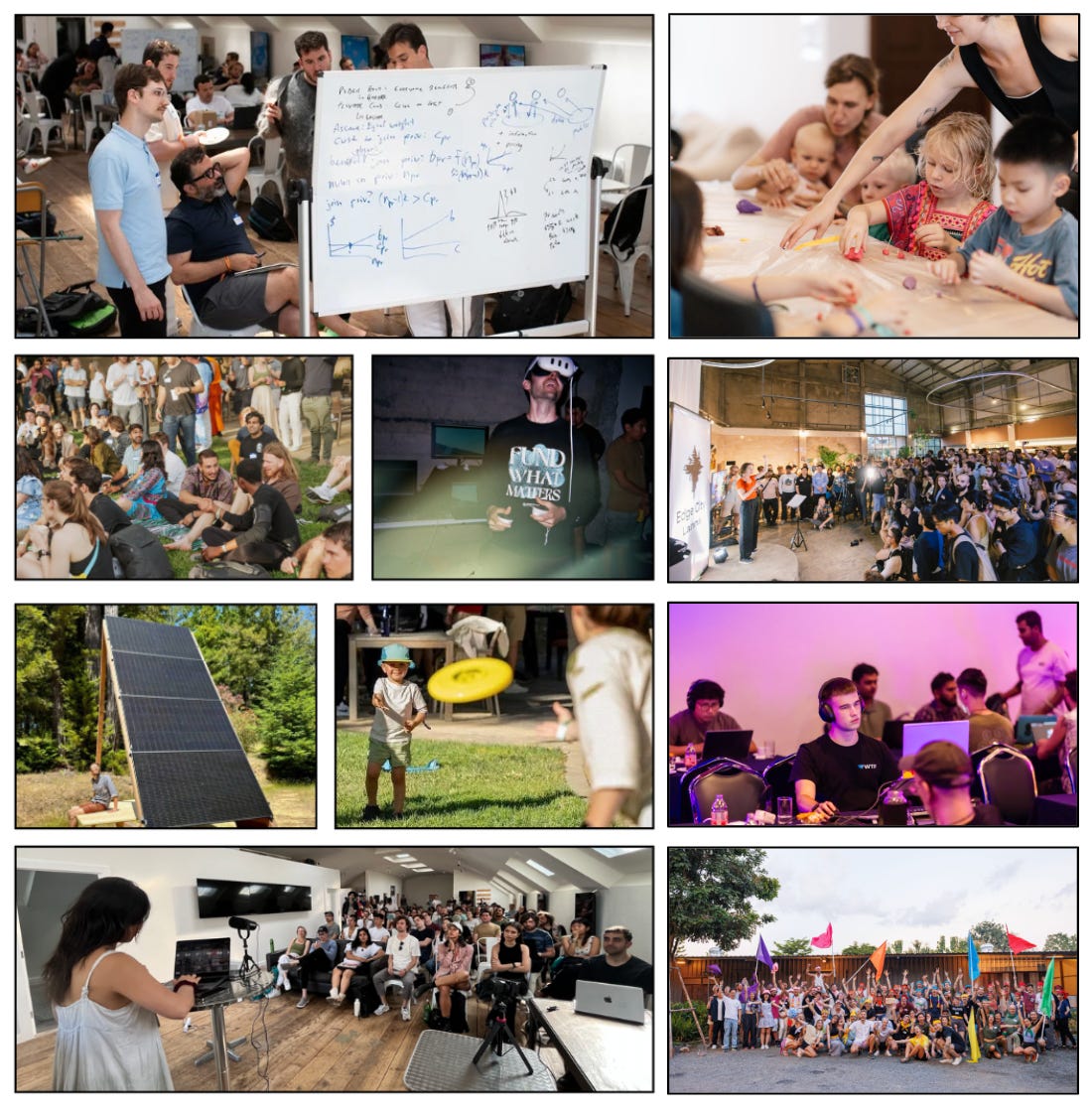
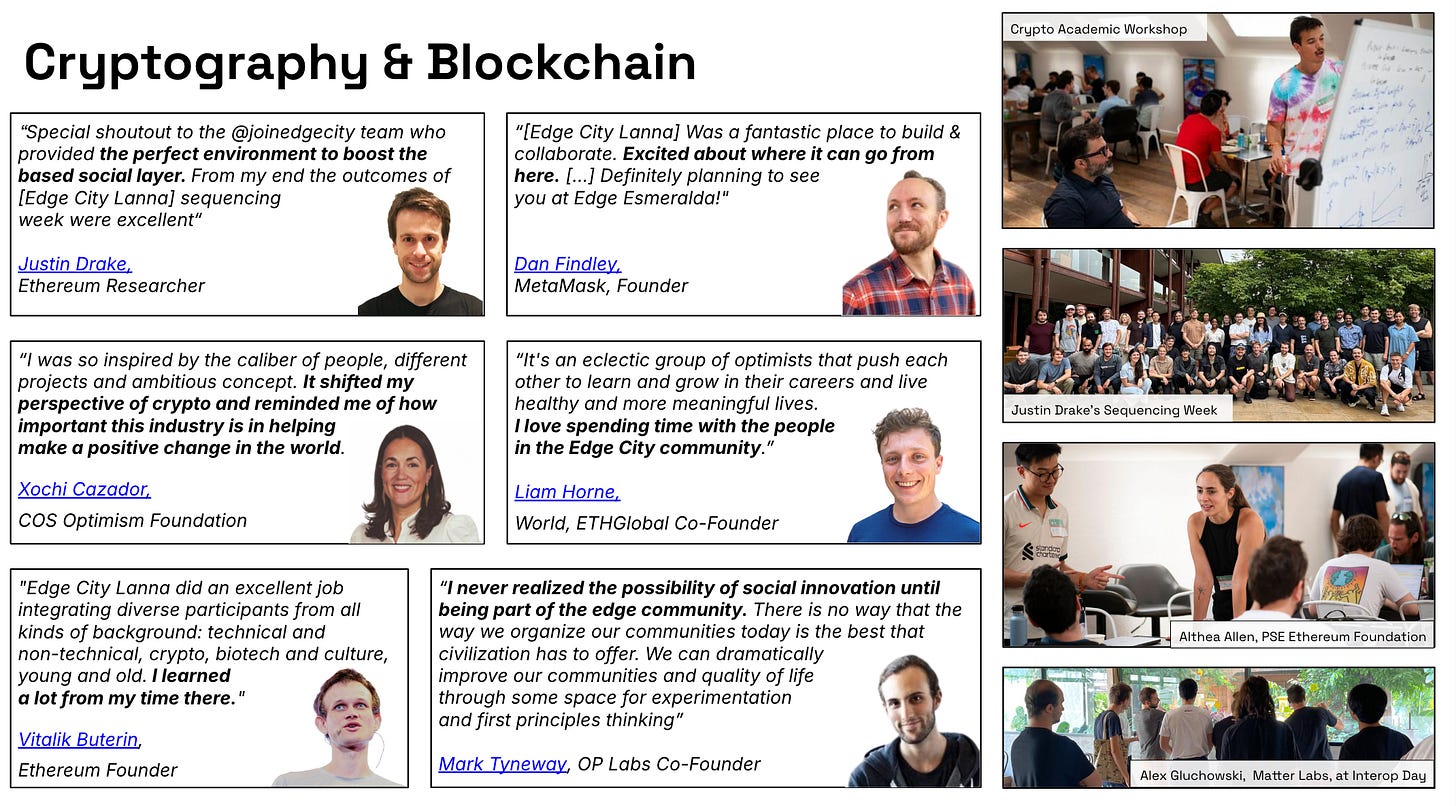
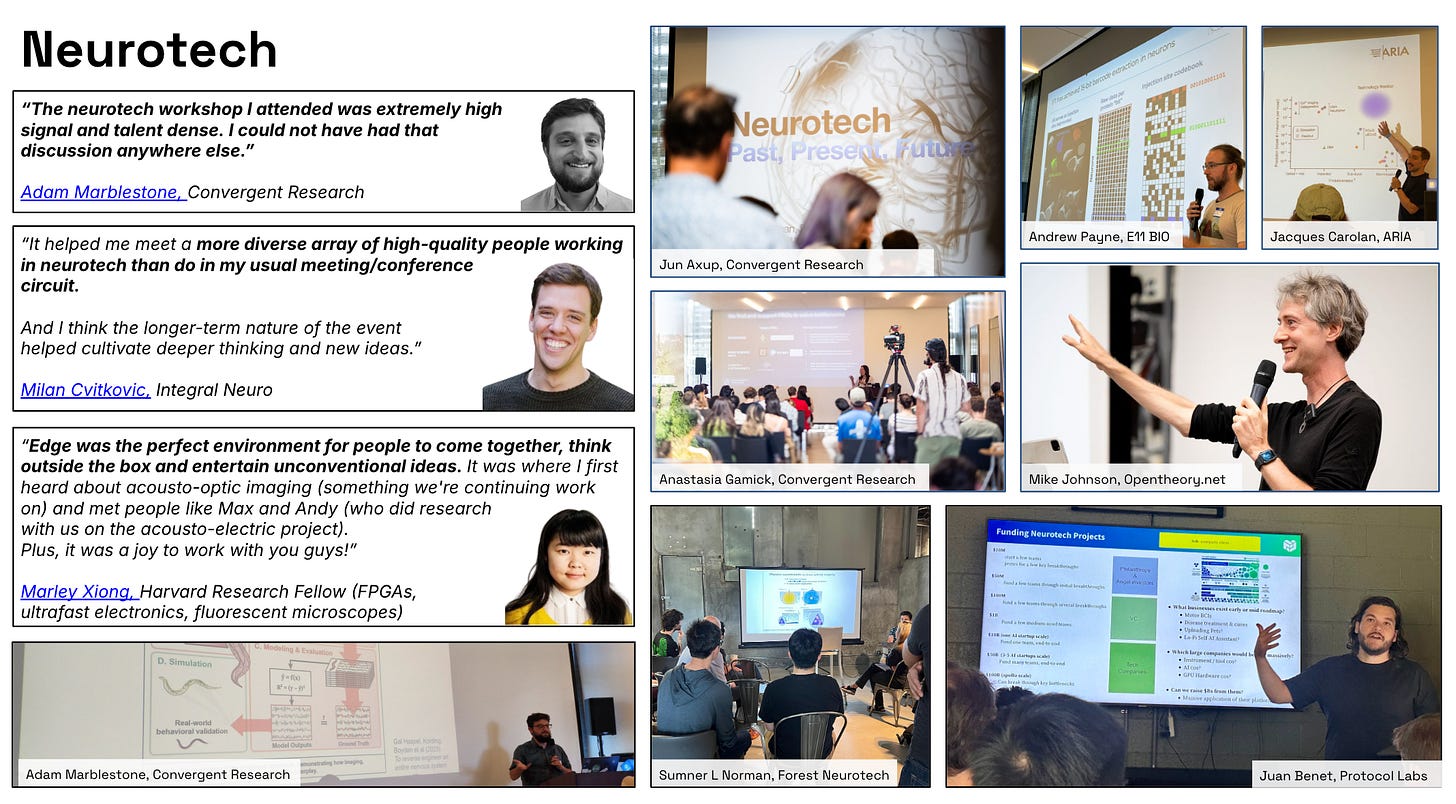
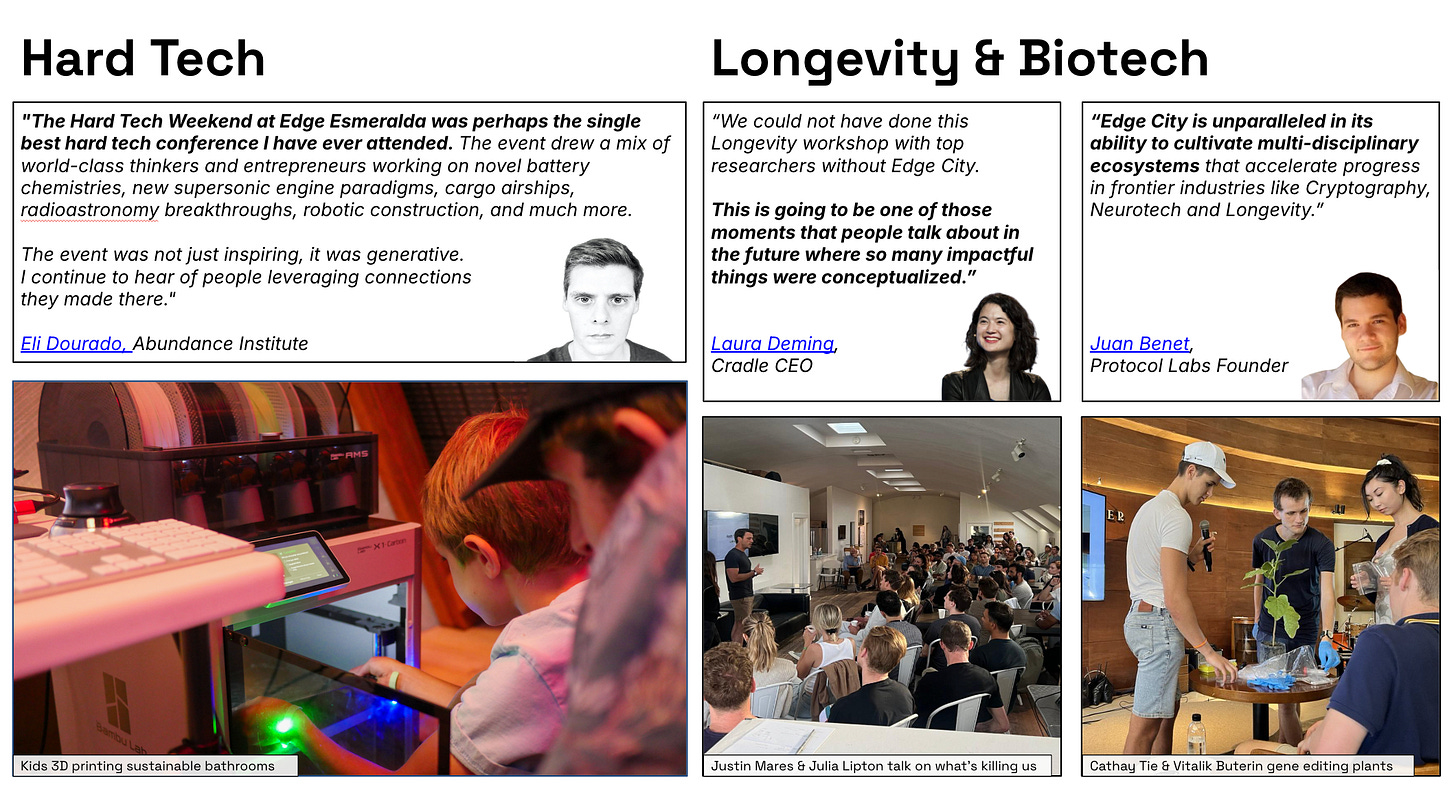
Some quotes from past Edge City attendees
Want to know more?
Edge City
- Edge City’s website
- See our 2024 retro & 2025 plans here
- Follow our socials to be the first to get updates:
Popup Villages & Network Societies
- Why I Built Zuzalu - Vitalik Buterin
- The Network State - Balaji Srinivasan
- Zone of Scenius - Timour Kosters
Connect with me, Telamon Ardavanis:
- X: https://x.com/TelamonArdavani
- Substack (new): https://telamonardavanis.substack.com/publish/posts
- LinkedIn: https://www.linkedin.com/in/telamon-ardavanis-b13b01162/
---
This is a guest post, first published on Telamon Ardavanis' Substack and shared here with permission. The views are Telamon's own and do not necessarily reflect the views of Edge City.

